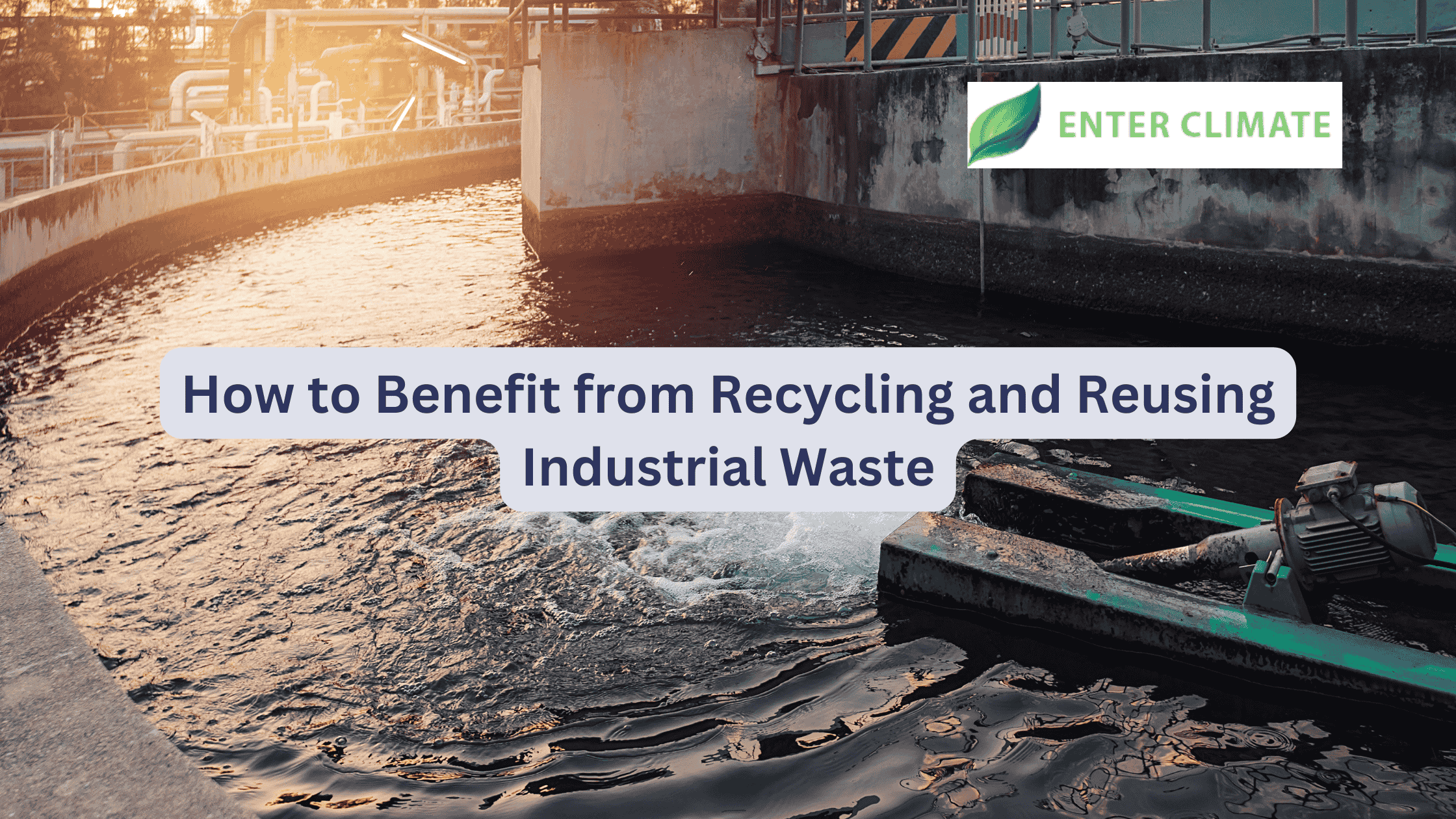How to Benefit from Recycling and Reusing Industrial Waste

Strong 8k brings an ultra-HD IPTV experience to your living room and your pocket.
Industrial waste is an unavoidable by-product of manufacturing processes. However, with the increasing push towards sustainability, businesses are now seeing industrial waste management not only as a regulatory requirement but as a business opportunity. Recycling and reusing industrial waste offer numerous benefits, from cost savings to enhanced brand reputation. In this blog, we’ll explore how industries can benefit from effectively recycling and reusing their waste while complying with Indian environmental guidelines.
What is Industrial Waste?
Industrial waste refers to any waste generated by industries during production processes, which can include raw materials, by-products, chemicals, or even end-of-life equipment. Proper industrial waste management aims to reduce the environmental impact of these wastes through recycling, reusing, and disposal in a safe manner.
Why Should You Recycle and Reuse Industrial Waste?
Cost Savings: One of the most significant advantages of recycling and reusing industrial waste is the cost savings it brings. By turning waste materials into raw materials, businesses can reduce the costs of sourcing new materials. This can lead to reduced operational expenses over time. For example, recycling metals, plastics, and paper can help companies cut down on the need for raw material procurement, which often involves additional transportation and processing costs.
Resource Conservation: Industrial waste often contains materials that can be repurposed into new products or even used in other processes within the same industry. For example, metal scrap can be melted down and used again in the manufacturing of new metal products. By recycling these materials, companies help conserve valuable resources and reduce the strain on natural reserves. This also contributes to reducing the need for energy-intensive processes involved in raw material extraction.
Environmental Impact Reduction: Recycling and reusing industrial waste is one of the best ways to lower a company’s environmental footprint. By diverting waste from landfills, industries prevent harmful substances from polluting the air, water, and soil. Moreover, many industrial wastes contain toxic chemicals that, if not managed correctly, can harm ecosystems and human health. Recycling and reusing ensure that these pollutants are handled safely, contributing to a cleaner environment.
Compliance with Environmental Regulations: In India, the government has set various regulations under the Environment Protection Act and Hazardous and Other Wastes (Management and Transboundary Movement) Rules, 2016. These rules govern the proper management and disposal of industrial waste. Adopting recycling and reuse practices can help industries comply with these regulations, avoid penalties, and protect their reputation. Sustainable waste management can also help in obtaining certifications like ISO 14001, which demonstrates commitment to environmental standards.
Improved Brand Image: Sustainability is becoming an important aspect of business reputation. More customers, investors, and stakeholders are now looking for companies that implement responsible waste management practices. By promoting recycling and reusing industrial waste, companies not only help the environment but also strengthen their brand image. Demonstrating a commitment to sustainability can attract eco-conscious consumers, making it easier to establish a competitive edge in the market.
Job Creation and Innovation: The process of recycling and reusing industrial waste can drive innovation within the industry. Companies may need to invest in new technologies or equipment to improve waste handling processes, which can lead to the creation of new products or services. Moreover, this sector can create new job opportunities in waste processing, research and development, and environmental management. By contributing to the circular economy, industries can foster a more sustainable and vibrant workforce.
Key Industries That Can Benefit from Recycling and Reusing Industrial Waste
Textile Industry: The textile industry generates vast amounts of waste, including fabric scraps, dyes, and chemicals. Many of these can be recycled or reused in innovative ways. For instance, fabric waste can be repurposed into new clothing or products like bags or upholstery. Textile companies can also recycle water used in dyeing processes, reducing water wastage and saving on operational costs.
Automotive Industry: The automotive industry produces a wide range of waste, including scrap metal, used tires, and automotive fluids. Metal scrap can be melted down and used to produce new vehicle parts, while old tires can be repurposed into rubber mats or playground surfaces. Reusing parts like engines, batteries, and transmissions can also reduce the need for new parts, thus cutting down on production costs and resource consumption.
Construction Industry: The construction industry generates large amounts of waste, including concrete, wood, metals, and plastics. Recycling construction materials can significantly reduce the amount of waste sent to landfills. Concrete waste can be crushed and reused for building new structures, while scrap metal can be melted down for reuse in new construction projects.
Chemical Industry: The chemical industry produces hazardous waste like solvents, acids, and oils. Recycling and reusing these chemicals can not only reduce waste but also save on raw materials. For example, solvents used in cleaning processes can be distilled and reused, reducing the need for fresh solvent purchases and minimizing chemical disposal risks.
How to Get Started with Recycling and Reusing Industrial Waste
Audit Your Waste Streams: Start by conducting a thorough audit of your waste streams to identify what types of waste are being produced, how much, and whether they have the potential for recycling or reuse. This will help you determine the most efficient and cost-effective solutions for waste management.
Implement Waste Segregation: Effective segregation of waste is the first step in recycling. By categorizing waste into recyclable and non-recyclable materials, businesses can streamline the recycling process and ensure that reusable waste is handled appropriately.
Partner with Recycling Companies: Collaborating with professional recycling companies that specialize in industrial waste management can help businesses properly handle their waste. These companies will often have the equipment and expertise needed to recycle or repurpose waste into valuable products.
Invest in Technology: Investing in modern recycling technologies can significantly improve the efficiency of waste management processes. Automated sorting systems, shredders, and chemical recovery systems can help maximize the recycling potential of industrial waste.
Train Employees: It is essential to involve employees in the recycling process. Providing training and raising awareness about the importance of waste reduction, recycling, and reuse can help create a culture of sustainability within the organization.
Conclusion
Recycling and reusing industrial waste are crucial components of sustainable industrial practices. These efforts can lead to cost savings, reduced environmental impact, and compliance with regulatory standards. By adopting effective industrial waste management strategies, businesses can not only improve their bottom line but also strengthen their commitment to environmental stewardship. With the right practices in place, industries can successfully turn waste into a valuable resource, benefiting both their business and the planet.
Frequently Asked Questions (FAQs)
1. What is the main benefit of recycling industrial waste?
Recycling industrial waste helps conserve resources, reduce environmental pollution, and save on costs by reusing materials that would otherwise go to landfills.
2. How can small businesses benefit from industrial waste management?
Small businesses can save money by reducing the costs of raw material procurement and disposal. They can also enhance their brand image by adopting sustainable practices, which attract eco-conscious customers.
3. What are some challenges in implementing recycling in industries?
Some challenges include the cost of setting up recycling infrastructure, the complexity of sorting waste, and the need for employee training. However, these can be mitigated with proper planning and investment in technology.
Note: IndiBlogHub features both user-submitted and editorial content. We do not verify third-party contributions. Read our Disclaimer and Privacy Policyfor details.


